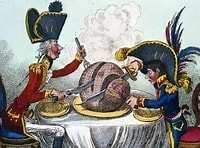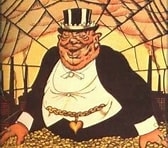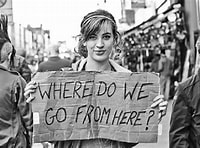Has Capitalism become theft?
By: Ramona Redgrave
Money is not Wealth and Wealth is not Money.
I am looking at Wealth in order to develop an understanding of how Capitalism works today and Wikipedia has rather let me down...

Wealth refers to value of everything a person or family owns. This includes tangible items such as jewellrey, housing, cars, and other personal property. Financial assets such as stocks and bonds, which can be traded for cash, also contribute to wealth. Wealth is measured as "net assets," minus how much debt one owes.
Its definition is rather anaemic, lacking, as it does, any sense of prosperity or abundance which, in my opinion, is how Wealth is now understood.
Then the question arises, how much prosperity takes a person from the category of well-off and into the category of wealthy?
If I have home, money and possessions worth £1m am I wealthy?
Someone on a modest wage in a rented one bedroom flat would probably say “yes”. Someone with several nice houses, a yacht and a private plane would probably say “no”. If my home is worth £500,000, not an overly extravagant price in today’s markets, should that be included in my wealth as Wikipedia states? If I sell it for its money value my life situation changes dramatically for I become homeless. If I have jewels valued at £100,000 and sell them for their money value my life situation changes only to the extent that I have less trinkets to display among my friends.

It is clear to me that wealth needs to have an element of differentiation of possessions - those which serve the necessities of life and those which are inessential [no matter how attractive or desirable]. If someone lives on a modest wage and in a rented flat but owns a genuine Goya given to him by an aunt, is he wealthy? Perhaps, he certainly owns something that is normally only a personal possession of someone wealthy. However, although he has a nice picture to look at, his life won’t change for the better unless he converts the Goya into money Until then he has the potential to be wealthy but that is not the same as actually being wealthy.
To my way of thinking, being wealthy is having a significant excess of money, or possessions which can be easily turned into money, without diminshing one’s life style. If I use that as a working definition, I then ask myself; what constitutes a significant excess?
Let us say that an entrepreneur develops a product or service that is wildly successful. She forms a company and floats on the Stock Exchange. Investors now own the company alongside her, and her wealth (for she is now regarded as wealthy) resides in the money she has made from the floatation and the shares she holds in the company which are a liquid asset and therefore, for the purposes of establishing her wealth status, the same as money. However, being wealthy is not a static state. Inflation will eat into her money if it simply sits in an account, so the money must be put to work to maintain its value otherwise her wealth decreases if inflation is operative at positive levels, so she hands her money over to the Wealth Management department of an Investment Bank while she works hard to keep the company improving and the stock maintaining or increasing its value. Inflation rates change, investments can go down as well as up, competitors arrive in the market and the value of her company’s stock declines in the face of the competition. She is wealthy, then more wealthy, then not so wealthy, then… her excess of money is not a fixture, it is a variable, so her status as wealthy is unstable. She has turned the value of her possession, her company, into shares and they are vulnerable to forces to some degree outside her control. A market correction can wipe 10-20% off her stock value, and they happen all too frequently. A poor performance by her Investment Bank can do the same for her money, and that also happens all too frequently. These are not rare or unusual events. Is she still wealthy? Let us be kind and say, yes, for the moment, but things can change. Perhaps this is best expressed by quoting someone who was, at the time, the richest man in the US:
“A billion dollars isn’t worth what it used to be”. J. P. Getty 1892-1976.
This unstable nature of wealth needs to be a part of my understanding of its place in the current economic system. Of course, if someone has billions of dollars, two super yachts, owns property, owns companies, they are, by any definition, wealthy and likely to remain so. But extreme examples don’t usually serve any useful purpose when trying to understand general principles, probably because, to achieve such an extreme position, general principles of all sorts were thrown overboard fairly early on. The extreme is the exception not the rule and I am looking for a rule.
So, in trying to understand Capitalism as it operates today, how should I understand Wealth?

Let’s go back to our friend with the generous auntie. The Goya is worth millions but what if auntie added a condition on her nephew owning it - that he couldn’t sell it but must pass it on within the family before or after his death. He is still lucky, he owns a Goya, but is he still potentially wealthy? I don’t see how he can be. Wealth turns on a basic principle of Capitalism, the ability to dispose of your own possessions in any way you please. The nephew is in possession of a Goya but is not at liberty to dispose of it as he pleases therefore, although it can count as private property, it cannot count as wealth as I am using the term.
Adam Smith (1723-90), often called the Father of Economics (and the Father of Capitalism), began the study of Wealth in his publication, An Inquiry into the Nature and Causes of the Wealth of Nations, in which he reflected on such topics as; the control of production, private ownership, the division of labour, free markets, productivity and, not least, profit. Wealth, as an element of what was then called Political Economy, referred to the collective resources of a nation and in his seminal treatise he explained what he considered to be the most efficient way to structure its management to maximise a nation’s economic prospects. The tremendous popularity and widespread acceptance of his ideas was due in no small part to the fact that he was writing as the Industrial Revolution took hold and everything began to change not only quickly but forever.
I found it odd that Adam Smith, a founding father of the capitalist system, was talking about the best way to serve the common good, the best interests of all the citizens of a nation, yet it seems he was. An essential part of his vision of the most efficient management of a nation’s wealth was to remove collective ownership and replace it with private ownership because, in his view, the benefit would be to everyone, brought about by the “Invisible Hand” which describes the unintended social benefits of self-interested actions, a concept he first introduced in The Theory of Moral Sentiments, 1759….
“It is not from the benevolence of the butcher, the brewer, or the baker, that we expect our dinner, but from their regard to their own interest. We address ourselves, not to their humanity but to their self-love, and never talk to them of our necessities but of their advantages.”
“[The rich] consume little more than the poor, and in spite of their natural selfishness and rapacity…they divide with the poor the produce of all their improvements. They are led by an invisible hand to make nearly the same distribution of the necessaries of life, which would have been made, had the earth been divided into equal portions among all its inhabitants, and thus without intending it, without knowing it, advance the interest of the society...”
As I said, that Adam Smith wantedto find a way of betterment for all, came to me as something of a surprise but it helped me in my search of where wealth fits into today’s forms of Capitalism - to promote private property common ownership had to end. Common ownership, he maintained, prevented individual genius, driven by selfishness and rapacity [his words not mine], from operating efficiently to increase Wealth. Therefore, individual ownership should, wherever possible, replace it.
So, what changed and how?

In Britain common land was usually shared by a community for grazing, panage [allowing pigs to forage for beech mast, acorns or other nuts] for family cultivation in strips, for fuel gathering either of wood or by peat digging. It arose and became embedded in British life as part of the manorial system of the Middle Ages. The process of dismantling this system was enclosure, which began during the 16th century and was accomplished in various ways. The two most used were; the purchase of common rights and replacing them with private rights, and passing laws - Parliamentary enclosure - which often encountered resistance and was enforced by violence. Not surprisingly it has kept a controversial place in the agricultural and economic history of Great Britain. The theory that underpinned enclosures was that land under control of a farmer who was free to adopt better farming practices would make the land more productive. It worked so well that the period became known in UK history as the British Agricultural Revolution. It also had the effect of driving people off the land and turning them into the labour supply so necessary to the Industrial Revolution. This commoditisation of land, whereby it could be bought and sold as private property, was not confined to Britain. It happened in all industrialising countries.
In the United States of America, whole swathes of the country had been ceded to Native American tribes by treaty and were usually held in common as hunting grounds but…
From 1778 to 1871, the United States government entered into more than 500 treaties with the Native American tribes; all of these treaties have since been violated in some way or outright broken by the US government, while at least one treaty was violated or broken by Native American tribes.
Wikipedia
…so it was that the treaty lands held in common by tribes were confiscated and, as the US moved west, either given away to settlers or sold to investors.
Another form of common ownership, widespread in European Catholic countries and leftover from centuries of accommodation and struggle between monarchs and the Catholic Church, was Church Lands, held by the Church supposedly for the good of the people. The Portuguese and the Spanish exported this form of common ownership to South and Central America and California.
All these various forms of common ownership came under pressure and either massively reduced or disappeared as the Industrial Revolution spread.
Capitalism declared that common ownership of land resulted in poor productivity and land, like everything else, must be bought and sold. Only in this way could it increase in value by improvements brought about by the owner whose motivation was personal gain through profit.
Private ownership was the only way to make sure natural resources could be properly developed or exploited to the benefit of the economy as a whole and, therefore, to the eventual good of the whole population. This was part of the bedrock of Adam Smith’s Capitalism. Everything must be a commodity, including human beings in the form of labour, to be bought and sold, to create profit for the owners by the use of improved productivity. All of which was to be accomplished by the increased use of money.
Money was the essential grease which would keep the wheels of Capitalism running smoothly as the Industrial Revolution unfolded across the world in all its myriad forms and, if everything was now a commodity, then everything now had a price and the measure of an individual’s Wealth increasingly became the sum of his or her possessions expressed in the form of money – minus your debts, of course. So, you see why our friend with the generous auntie, although the owner of a Goya, could not be classed as wealthy or even rich. His main asset lacked the necessary liquidity!
Having arrived at the conclusion that money is the fundamental unit in the measure of Wealth, I’d like to try and understand the place money has assumed (or been given) in our Capitalist system today. To try and do this I have decided to go back to Adam Smith and The Wealth of Nations. Capitalism states that the best way to ensure that the wealth of a nation is not squandered is to use it efficiently. For wealth to be used efficiently it must be handed in some way to individuals who have the motivation and skills to use their allocation of wealth most productively. In this way the nation as a whole prospers as its collective wealth grows.
If I have understood this correctly, the original justification for the promotion of Capitalism was:
it is the most efficient way of using a nation’s resources to promote the good of all, the Common Good.
From this, again if I have understood it correctly, it follows that Adam Smith and those who followed his economic theories accepted that a nation’s wealth derives from and ultimately belongs to the people of the nation regardless of how it is temporarily divided up among individuals for the purpose of managing it most efficiently.
Capitalism, therefore, according to Adam Smith, is based on stewardship not outright ownership.
If this idea of stewardship is accepted does it not follow that if a Capitalist today, for personal gain, finds a way to deliberately decrease a nation’s wealth this can understood as a form of theft?

Capitalism never has claimed that capitalists were uniformly warm, wonderful, human beings - their natural selfishness and rapacity – was remarked on by Adam Smith. Capitalism, like all human activities, can never be perfect or even close to perfect and must be seen, understood and judged in the context of the times in which it is operative.
When Adam Smith was writing, he had no doubt that the readership he sought to inform shared his understanding of a Nation and that definition at the time was…
Webster’s Dictionary 1828.
A Nation. A body of people inhabiting the same country, or united under the same sovereign or government; as the English nation; the French nation. It often happens that many nations are subject to one government; in which case, the word nation usually denotes a body of people speaking the same language, or a body that has formerly been under a distinct government, but has been conquered, or incorporated with a larger nation Thus the empire of Russia comprehends many nations, as did formerly the Roman and Persian empires.
That definition, however, does not express the understanding of a nation as a unit of concerted action, or, if you prefer, Nationalism, whereby a nation cooperates to defend and promote the interests of its people. If you have a nation, then I don’t see how you can avoid nationalism erupting in various forms in various places at various times. The present is a good example.
So, what do we understand today by Nationalism…?
Wikipedia puts it thus:
The template of nationalism, as a method for mobilising public opinion around a new state based on popular sovereignty (my emphasis), went back further than 1789: philosophers such as Rousseau and Voltaire, whose ideas influenced the French Revolution, had themselves been influenced or encouraged by the example of earlier constitutionalist liberation movements, notably the Corsican Republic (1755–68) and American Revolution (1765–83).
The rise of Nationalism - the popular acceptance of a National identity, the concept of National action, a common understanding of a Nation’s interests - surged across the globe at the same time as the Industrial Revolution. They fed off each other and created a new world order of nations which competed with each other, fought with each other, created treaties and alliances and broke them, all to enrich themselves for the benefit of their subjects and citizens. It is in this context that Capitalism arose - but that is not the context of today.
Nations and Nationalism still exist. Countries still compete, fight, form and break treaties and alliances, but today other powerful non-national entities indulge in the same behaviour. Businesses have been created that can equal and exceed nations in wealth and political power. Which brings me to the my question...
If a Capitalist manages his or her share of a nation’s wealth and uses the proceeds to enrich a non-national business rather than the nation from which the wealth under management originated, is that theft?
A business may locate its operation in a particular country or in several countries and benefit from the resources, human and otherwise, of the places in which it operates to create money or money equivalent profits. But if the profit created goes to a non-national entity, a business, a hedge fund, an investment company, or some other financial or commercial institution, and never returns to and improves the wealth of the nation or nations in which the profits were made, what then? If modern Capitalism uses money to transfer wealth permanently out of a nation or nations and into a company or companies, has it become no more than an engine of institutionalised robbery?
The heart of modern Capitalism still beats to the same rhythm on which it was founded; private property, a free market and profit. Money is still its lifeblood. But something has changed. Originally, as I understand it, the ultimate purpose of the system was to keep the body politic healthy by maintaining or improving its wealth, now its purpose seems to be to accrue money to those who can best use the system. Today’s most successful Capitalists seek to suck money out of nations and transfer it permanently to private ownership. This has been made possible by turning money itself into a commodity which can be bought and sold – using money to generate money without creating any social value....

....to be continued.
